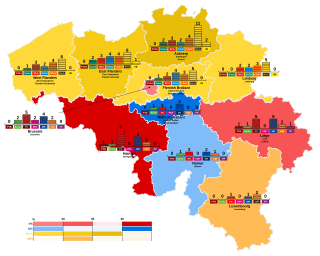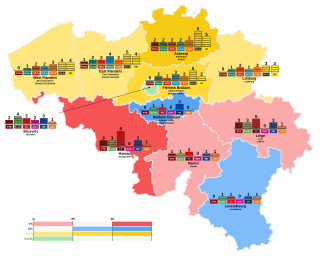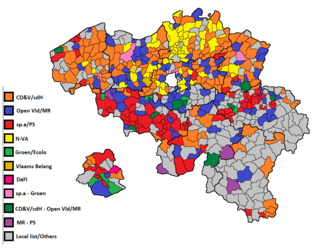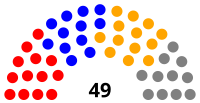
The Benelux Union or Benelux is a politico-economic union and formal international intergovernmental cooperation of three neighbouring states in western Europe: Belgium, the Netherlands, and Luxembourg. The name is a Blend word formed from joining the first few letters of each country's name and was first used to name the customs agreement that initiated the union. It is now used more generally to refer to the geographic, economic, and cultural grouping of the three countries.
The Labour Party is a social-democratic political party in the Netherlands.

The politics of the Netherlands take place within the framework of a parliamentary representative democracy. A constitutional monarchy, the country is organised as a decentralised unitary state. The Netherlands can be described as a consociational state. Dutch politics and governance are characterised by a common striving for broad consensus on important issues, within both of the political community and society as a whole.

Democrats 66 is a social liberal and progressive political party in the Netherlands, which positions itself in the centre of the political spectrum. It is a member of the Liberal International (LI) and the Alliance of Liberals and Democrats for Europe (ALDE).

The Workers' Party of Belgium is a Marxist and socialist political party in Belgium. It is the only Belgian party represented in parliament that is a fully national party, representing both Flanders and Wallonia. Having historically been a small party, the PTB-PVDA has gained momentum since the 2010s, continuously scoring better at the elections, particularly in Wallonia and working-class communities in Brussels.

General elections were held in the Netherlands on 6 May 1998.

Municipal elections were held in the Netherlands on 7 March 2006. About 11.8 million people could vote in 419 municipalities. Due to municipal reorganisations, 15 municipalities held elections in January 2006 and 24 municipalities held elections in November 2006. In some cities, such as Amsterdam, there were two elections, for the municipality and for the borough councils.
Purple is a common term in politics used to describe governments or other political entities consisting of parties that have red and blue as their political colours. It is of particular note in three countries. In the politics of the Netherlands and Belgium, purple is the term for a government coalition of social democrats and liberals, excluding christian democrats. It is derived from the combination of the colour of the social democrats (red) and liberals (blue).

The Belgian provincial, municipal and district elections of 2012 took place on 14 October. As with the previous 2006 elections, these are no longer organised by the Belgian federal state but instead by the respective regions:

General elections were held in the Netherlands on Wednesday 15 March 2017 to elect all 150 members of the House of Representatives.

Federal elections were held in Belgium on 25 May 2014. All 150 members of the Chamber of Representatives were elected, whereas the Senate was no longer directly elected following the 2011–2012 state reform. These were the first elections held under King Philippe's reign.
Regional elections were held in Belgium on 25 May 2014 to choose representatives for the Flemish Parliament, Walloon Parliament, Brussels Parliament and the Parliament of the German-speaking Community. These elections were held on the same day as the 2014 European elections as well as the 2014 Belgian federal election.

Federal elections were held in Belgium on 26 May 2019, alongside the country's European and regional elections. All 150 members of the Chamber of Representatives were elected from eleven multi-member constituencies.

The Belgian provincial, municipal and district elections of 2018 took place on Sunday 14 October 2018. They are organised by the respective regions:

General elections were held in the Netherlands from 15 to 17 March 2021 to elect all 150 members of the House of Representatives. Following the elections and lengthy coalition formation talks, the sitting government remained in power.
In the run up to the 2024 Belgian federal election, various organisations carry out opinion polling to gauge voting intention in Belgium. The date range for these polls are from the 2019 Belgian federal election, held on 25 May, to the present day. The results of nationwide polls are usually numerically split into the three Belgian regions: Flanders, Brussels and Wallonia. Federal seat projections for the Chamber of Representatives are presented together under these regional polls. The federal election will be part of a group of elections which also include the regional elections and the European elections. Some polls might be undefined voting intentions without differentiating between the elections.
In Belgium, the government formation of 2019–2020 started one day after the federal elections, regional elections and European elections which were all held simultaneously on 26 May 2019. These formations were only the second under King Philippe.

The De Croo Government is the incumbent Federal Government of Belgium, led by Prime Minister Alexander De Croo since 1 October 2020.

Early general elections were held in the Netherlands on 22 November 2023 to elect the members of the House of Representatives. The elections had been expected to be held in 2025 but a snap election was called after the fourth Rutte cabinet collapsed on 7 July 2023 due to immigration policy disagreements between the coalition parties. The incumbent Prime Minister Mark Rutte announced that he would not lead his party into the election and that he would retire from politics.

Federal elections are scheduled to be held in Belgium on 9 June 2024. The 150 members of the Chamber of Representatives will be elected for a five-year term. European and regional elections are scheduled to take place on the same day.















